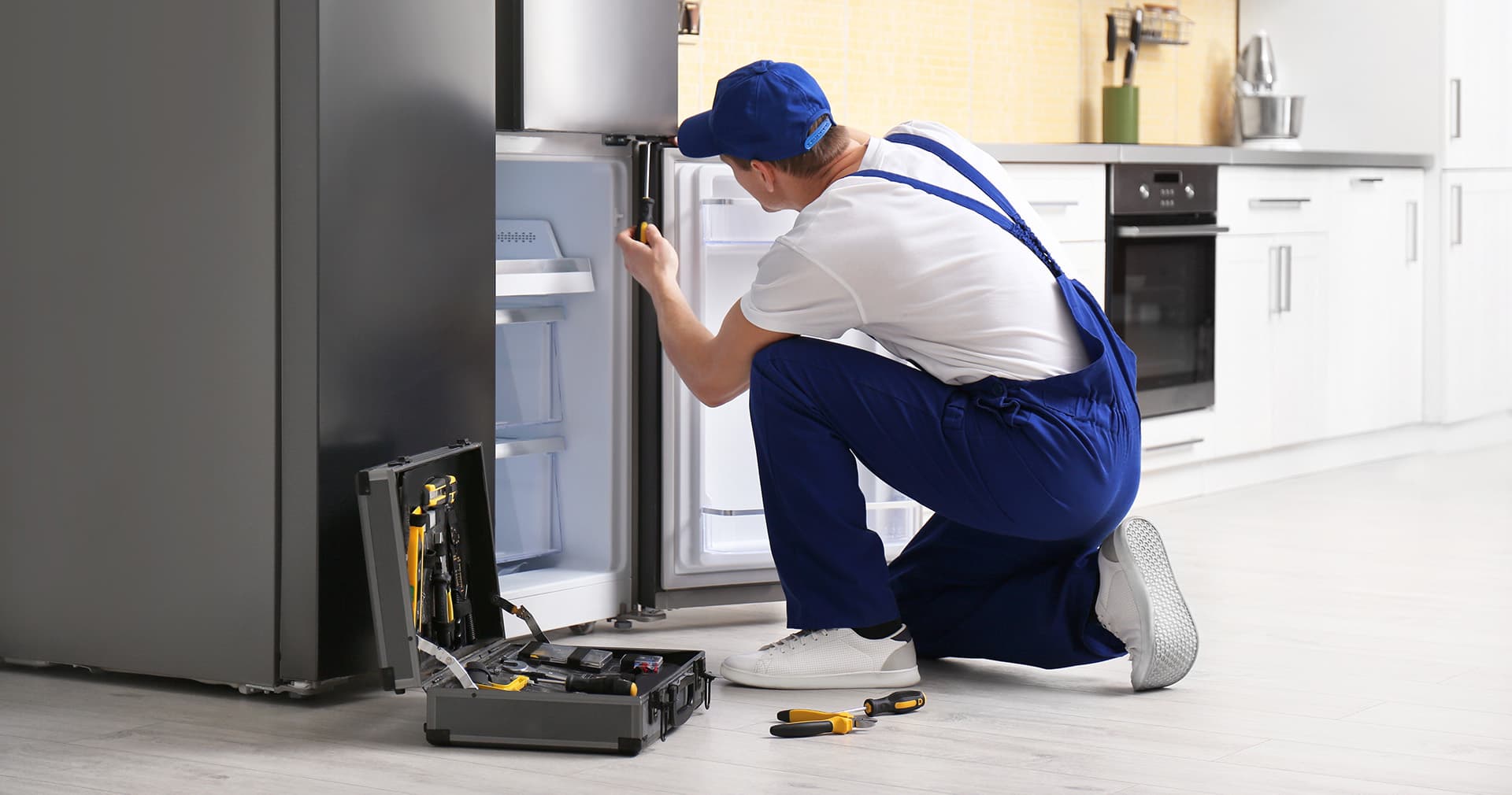
There’s nothing more frustrating than when the appliances we rely on break down. Luckily, we can count on appliance repair technicians to get everything back up and running.
Appliance repair is a rewarding profession. No two days are the same, and your services are always in demand. These are just some reasons why almost 80,000 people in the U.S. have chosen this career.
If you are interested, too, the first step is learning how to become an appliance repair technician. This guide has you covered.
To begin, we’ll explain why you should research the industry. Then, we’ll walk through the education you need.
We’ll list some certificates you can earn and how to get hands-on experience.
We’ll compare and contrast the realities of working for yourself vs. for a company. And, to wrap up, we’ll share some tips you can follow to get started now.
Research the Appliance Repair Industry
Before you decide to become an appliance repair technician, you should do a deep dive into the industry. You want a solid foundational understanding of your potential market.
Consider the who, what, and where of the appliance repair industry:
- Who: Your main customers will be homeowners, landlords, and businesses that use appliances daily. This includes families needing fridge repairs, restaurants that need oven fixes, or landlords taking care of many properties.
- What: You can offer many different services as an appliance repair technician. These range from simple repairs to more complex work, like fixing smart appliances.
- Where: Where you work affects what services you’ll offer. For example, city work might include fixing compact, high-tech apartment appliances. In rural areas, appliances might be older. Appliances break down faster in places like Florida and the Southeast, where it’s very hot and humid. This means more work for repair technicians.
With these insights in mind, consider potential areas of specialization:
- Residential appliance repair: This is the most common type and involves fixing home appliances. You’ll work on refrigerators, washers, dryers, and microwaves.
- Commercial appliance repair: You’ll work with businesses like restaurants, laundromats, and hotels. The appliances are bigger and often more complex than those in homes.
- Smart appliance repair: With more homes using smart technology, specializing could be very profitable. These devices need more technical knowledge because they connect to home internet networks.
- HVAC systems: HVAC systems need similar skills for repair and installation. This can be an excellent area to work in, especially where the weather is very hot or very cold.
Finally, think about pricing. When fixing or replacing an appliance, most customers think about cost first.
You need to set fair prices for your services. These should be mindful of the cost of purchasing new appliances.
For reference, the average fridge repair cost is between $200 and $300. You can expect to charge your customers between $50 and $125 per hour.
RELATED ARTICLE: Marketing Your Appliance Repair Business: 10 Ideas that Work

Educational Requirements for Appliance Repair
The next step in learning how to become an appliance repair technician is understanding your educational requirements.
Here are some of the potential pathways:
Technical or Vocational Training
You can take courses in appliance repair. Community colleges, adult education centers, and vocational schools generally offer these.
Training programs typically cover various appliances—from refrigerators to washing machines. They also include training on other valuable skills. This might include drywall, plumbing, woodworking, electricity, and blueprint reading.
Certifications and Licenses
You don’t need a certification to work as a general appliance repair technician. But specializing can improve your job prospects.
Depending on where you live, you may need a license to operate legally. This often involves passing a state-level exam.
You’ll also need a valid driver’s license, as the job usually requires traveling to clients’ properties.
Real-World Experience
Experience is a must in the appliance repair industry. You can gain this through internships or on-the-job training.
Many technical schools offer internships as part of their programs. These allow you to learn from experienced technicians.
Certificates to Become an Appliance Repair Technician
Here are some certifications you might need or choose to earn to advance your career in appliance repair:
National Appliance Service Technician Certification (NASTeC)
The International Society of Certified Electronics Technicians offers the NASTeC certification. It’s recognized across four levels:
- Refrigeration and air-conditioning
- Cooking
- Laundry and dishwashing
- Universal technician (covering all three specialties plus basic skills)
To earn a NASTeC certification, you must pass the basic skills exam and at least one specialty exam.
If you pass all four, you become a NASTeC Universal Technician. This shows you have a comprehensive understanding of different appliances and their repair needs.
RELATED ARTICLE: 6 Tips to Get More Appliance Repair Leads
Professional Service Association (PSA) Certification
The PSA offers several certification levels for appliance repair technicians who pass their exam.
State Licensing
You might need a license to work as an appliance repair technician in some states.
Licensing requirements include standards of education, training, and experience. You’ll also have to pass an exam.
If you plan to start your own appliance repair business, you might need a business license and a general contracting or handyman license. This also depends on the rules in your state.
Check with your state’s licensing board to learn more.
Environmental Protection Agency (EPA) Certification for Refrigerants
Refrigerants—such as chlorofluorocarbons—can harm the environment if not managed properly.
The EPA requires all technicians who work with refrigerants to earn the Section 608 Technician Certification. To get this, you must pass an EPA-approved exam.

How to Gain Hands-On Experience in Appliance Repair
Hands-on experience gives you a real-world taste of what it’s like to work as a repair technician. It also teaches you how to fix appliances and helps you feel confident when solving problems.
Here are ways you can start getting the experience you need:
- Vocational training programs: Join a vocational training program at a community college or technical school. These programs include lessons in the classroom and practice in labs. You will work with different appliances and learn from experts.
- Internships: Look for internships with appliance repair businesses. Internships let you learn by watching and helping skilled technicians. You will see how they find and fix problems.
- On-the-job training: Start working as an assistant in an appliance repair company. You will help more experienced technicians and slowly start doing more on your own.
Working Independently vs. as an Employed Technician
Another consideration is whether to work for yourself or a company. Both options have benefits and challenges.
Here are some different factors to think about:
Earning Potential
When you work for yourself, your earning potential can be higher. You set your own rates. But your income might change a lot because it depends on how many jobs you get.
Working for a company means you get a paycheck. It typically stays the same week to week. However, the company decides how much you earn. So, you might earn less, but the pay is consistent.
Challenges
Running your own business means you handle everything. You find your own customers, do all the repairs, and manage the business side, like insurance and taxes.
If you work for a company, you focus on repairs. The company deals with finding customers and managing the business. The drawback? You might have less control over which jobs you do and how you do them.
RELATED ARTICLE: Appliance Repair Software
Job Security
Job security is not a given when you work for yourself. If there are fewer people needing repairs, you make less money. It would be best if you were good at marketing your services, finding new customers, and retaining existing ones.
In contrast, working for a company usually offers more job security. You are less likely to run out of work because the company finds the customers. They also provide benefits like health insurance, which you must manage independently if you are independent.
Lifestyle
Being your own boss means you can choose your hours and the kind of jobs you take. This flexibility is great if you want to balance work with family life or other interests.
Working for a company means you might have less control over your schedule. But you often have a more predictable routine. This can make planning your life outside of work easier.
Making the Right Choice for You
Deciding whether to work independently or as an employed technician can take time and effort. Here are three tips to help you choose:
- Assess your personal skills. Are you good at balancing many tasks? Are you interested in how business works? You might do well working independently. If you like focusing on repairs, consider working for a company.
- Factor in your financial needs. Do you need a steady income? Working for a company might feel safer. If you are okay with your earnings going up and down, running your own business could work well.
- Look at your long-term goals. Do you want to build your own business one day? Do you want to create a legacy? If so, working independently could be right for you. Working for a company is a good choice if you prefer job security and benefits.
First Steps to Become an Appliance Repair Technician
Here are some simple first steps you can take now:
- Decide on your niche. Choose what kind of appliances you want to specialize in. This could be general home appliances, commercial equipment, or smart appliances.
- Research training programs. Look for technical schools or community colleges offering appliance repair courses in your area. Check what kinds of appliances they cover.
- Calculate training costs. Find out how much it will cost to complete these training programs. This will help you plan your budget.
- Weigh employment options. Think about whether you want to work for a company or start your own business. Each choice has different benefits and challenges.
Related Posts
Should Your Contracting Business Offer Flat Fees?
Continue ReadingHow to Write a Quote for a Plumbing Job
Continue ReadingStay Informed
Get the latest news and insights plus, Service Fusion offers and updates.Thank you for your submission.

SHARE